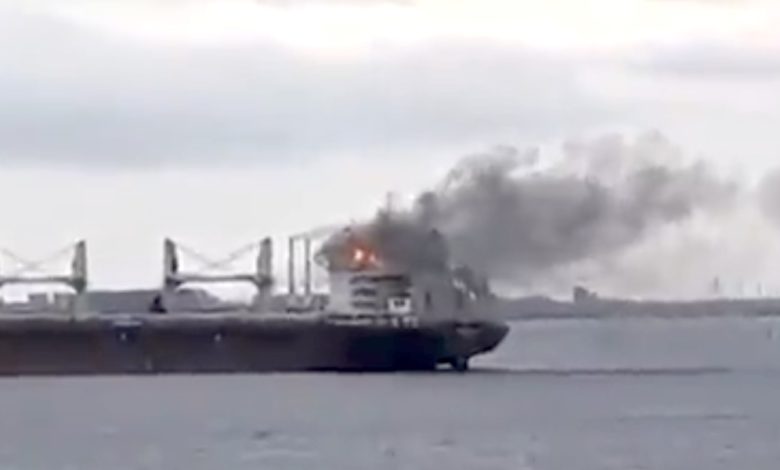The minutiae of war and shipping

A merchant seaman, Mr Hadisur Rahman, third engineer onboard the bulk carrier Banglar Samriddhi, has already been killed in this conflict. Others have been injured. I want us all to remember that, because, from here on, I am going to deal with the topic at hand in my usual way. Yes, I am very serious indeed.
On April 2 1982 the queen of England found that she had enemies. They had declared themselves such by landing on the beach at Port Stanley in the Falkland Islands without showing their passports, and then shooting up the Royal Marines barracks at Moody Brook, which was empty, because the marines were defending the governor’s house. Nobody died – at that point. Lots of people died soon afterwards.
One effect of the queen having official enemies, in this case the government and the people of Argentina, was to trigger the operation of the queen’s enemies’ risks provisions in the Marine and Aviation Insurance (War Risks) Act of 1952, and, very fortunately, there was still one man in the City of London who remembered how those provisions worked. He knew this because he had worked under his father in the same job at the end of World War Two, and I know the story that I here relate because I was at that time a junior colleague of his.
These are some of the hosts of little things that go with war, so far as shipping is concerned, which many of us have forgotten
On October 19 1989 the citizens of Argentina ceased to be enemies of the queen in law, having ceased to be such in practice on June 14 1982, and that was that, so far as marine insurance and charter parties were concerned.
I mention this because it is the most obscure aspect of a sudden outbreak of war, and its effects on merchant shipping, that I can think of. There will be many more, and we are, each of us, about to find some. These are some of the hosts of little things that go with war, so far as shipping is concerned, which many of us have forgotten. There are going to be lots of these, and readers may like to add their own.
Some people are having to remember what happens in terms of demurrage under sundry charter parties when a ship is unable to discharge her cargo at the agreed place because the port work force refuses to work the ship, because of the place where she loaded all or some of her cargo. I think I did once know, but I have forgotten. Do you remember?
Do we remember much about the Black Sea; specifically, the Straits, and the Montreux Convention of 1938? The bit that we probably remember is that pilotage is not compulsory but is certainly advisable, but how many of us remember that merchant ships have the right of free passage in peace time, and in war time, unless Turkey is a belligerent, or – the bit that gets forgotten – clause 6 – if Turkey considers itself to be threatened – and let’s keep in mind that Turkey announced, on February 27, that a state of war now exists.
This may be a good moment to remember that Turkey joined NATO because Russia wanted to revise the Montreux Convention, soon after World War Two, and that the Cuba missile crisis began when Russia took a dim view of the US stationing nuclear missiles in Turkey and put some in Cuba. We may also remember that, years after that crisis was defused, it was found that Russian missile battery commanders in Cuba had been authorised to launch nuclear missiles without reference to superior authority in the event of an American landing in Cuba, and that the American military had indeed planned such a landing? We were that close.
A rather different question arises where – as is not unusual – a ship has a crew which includes either or indeed both Russians and Ukrainians, the latter being a not very happy circumstance, which owners and managers must rely on good old fashioned seamanlike common sense and decency to resolve, because the one thing both groups now have in common besides history is that none of them can go home.
As no Chinese curse ever said, we live in interesting times.
For all the news on how the invasion of Ukraine is affecting global shipping, check out Splash’s dedicated coverage here.

“the queen of England”?
No such beast Andrew. Anne was the last
Anne was Queen of England in 1707 prior to the Act of Union. Maybe Farage’s and Al de Pf’s Brexit will cause the situation to change.
Just future proofing, David! Good point.
Splendid. Cheers.
It’s somewhat ironic that whenever anyone mentions the Montreux Convention, I immediately think of Deep Purple’s “Smoke on the Water”
I think of the ship that didn’t fit the Convention – the part built aircraft carrier being towed from Ukraine to China to be converted into – allegedly- a casino, which was reputedly towed round the Black Sea whilst Turkey decided which Convention category it came into!
And now the West sits and waits……we’ve seen this before as well what that did for over 5 years.
So you want to start WWIII?
So much for freedom of speech!